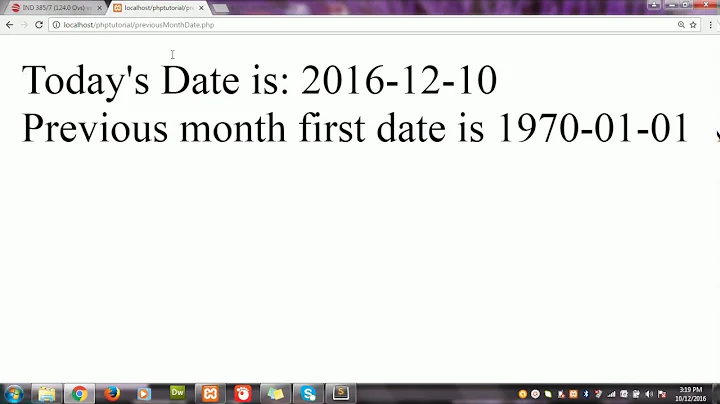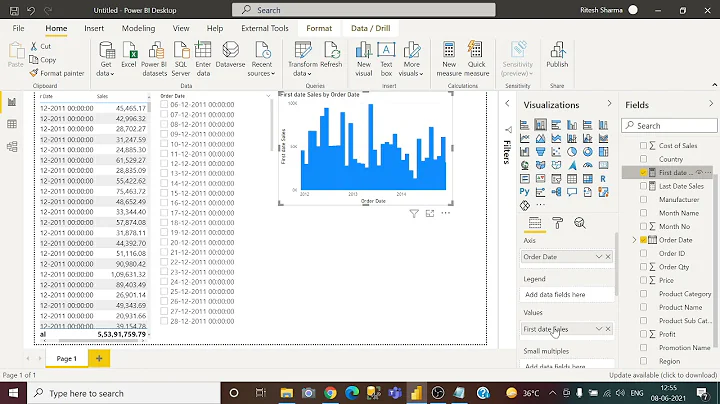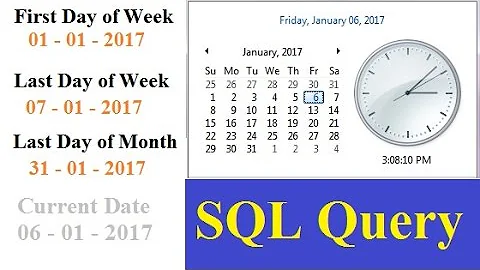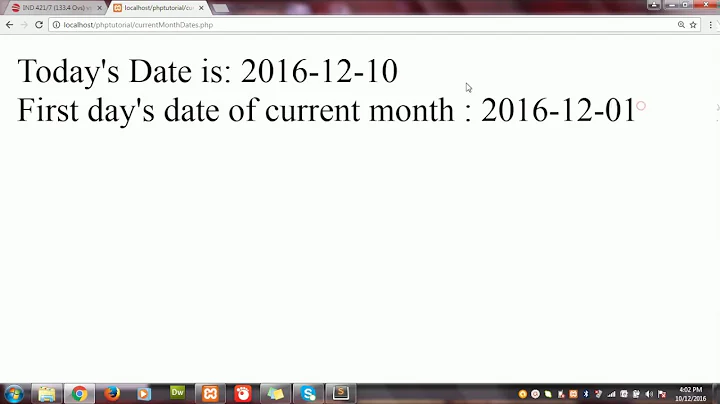Get firstdate, lastdate of month?
Solution 1
Some NSDate category methods I wrote will help you:
Here's an easy way to find the start of a month:
(NSDate *) startOfMonth
{
NSCalendar * calendar = [NSCalendar currentCalendar];
NSDateComponents * currentDateComponents = [calendar components: NSYearCalendarUnit | NSMonthCalendarUnit fromDate: self];
NSDate * startOfMonth = [calendar dateFromComponents: currentDateComponents];
return startOfMonth;
}
All it does is take the year and month components from the current day, then convert back to a date again.
For the end of the month, I use a couple of methods:
- (NSDate *) dateByAddingMonths: (NSInteger) monthsToAdd
{
NSCalendar * calendar = [NSCalendar currentCalendar];
NSDateComponents * months = [[NSDateComponents alloc] init];
[months setMonth: monthsToAdd];
return [calendar dateByAddingComponents: months toDate: self options: 0];
}
and
- (NSDate *) endOfMonth
{
NSCalendar * calendar = [NSCalendar currentCalendar];
NSDate * plusOneMonthDate = [self dateByAddingMonths: 1];
NSDateComponents * plusOneMonthDateComponents = [calendar components: NSYearCalendarUnit | NSMonthCalendarUnit fromDate: plusOneMonthDate];
NSDate * endOfMonth = [[calendar dateFromComponents: plusOneMonthDateComponents] dateByAddingTimeInterval: -1]; // One second before the start of next month
return endOfMonth;
}
This is a 3 step process - add one month to the current date, find the start of the next month, then subtract 1 second to find the end of this month.
Swift 3
extension Date {
func startOfMonth() -> Date? {
let calendar = Calendar.current
let currentDateComponents = calendar.dateComponents([.year, .month], from: self)
let startOfMonth = calendar.date(from: currentDateComponents)
return startOfMonth
}
func dateByAddingMonths(_ monthsToAdd: Int) -> Date? {
let calendar = Calendar.current
var months = DateComponents()
months.month = monthsToAdd
return calendar.date(byAdding: months, to: self)
}
func endOfMonth() -> Date? {
guard let plusOneMonthDate = dateByAddingMonths(1) else { return nil }
let calendar = Calendar.current
let plusOneMonthDateComponents = calendar.dateComponents([.year, .month], from: plusOneMonthDate)
let endOfMonth = calendar.date(from: plusOneMonthDateComponents)?.addingTimeInterval(-1)
return endOfMonth
}
}
Swift 2
extension NSDate {
func startOfMonth() -> NSDate? {
let calendar = NSCalendar.currentCalendar()
let currentDateComponents = calendar.components(.CalendarUnitYear | .CalendarUnitMonth, fromDate: self)
let startOfMonth = calendar.dateFromComponents(currentDateComponents)
return startOfMonth
}
func dateByAddingMonths(monthsToAdd: Int) -> NSDate? {
let calendar = NSCalendar.currentCalendar()
let months = NSDateComponents()
months.month = monthsToAdd
return calendar.dateByAddingComponents(months, toDate: self, options: nil)
}
func endOfMonth() -> NSDate? {
let calendar = NSCalendar.currentCalendar()
if let plusOneMonthDate = dateByAddingMonths(1) {
let plusOneMonthDateComponents = calendar.components(.CalendarUnitYear | .CalendarUnitMonth, fromDate: plusOneMonthDate)
let endOfMonth = calendar.dateFromComponents(plusOneMonthDateComponents)?.dateByAddingTimeInterval(-1)
return endOfMonth
}
return nil
}
}
Solution 2
Try this trick.
Day Param: 1 is to Get first date of this month
Day Param: 0 is to Get last date of this month by getting last date of month previous to next month (means this month))
- (void)returnDate:(NSDate *)date {
NSCalendar * calendar = [[NSCalendar alloc] initWithCalendarIdentifier:NSGregorianCalendar];
unsigned unitFlags = NSYearCalendarUnit | NSMonthCalendarUnit;
NSDateComponents *comps = [calendar components:unitFlags fromDate:date];
NSDate * firstDateOfMonth = [self returnDateForMonth:comps.month year:comps.year day:1];
NSDate * lastDateOfMonth = [self returnDateForMonth:comps.month+1 year:comps.year day:0];
NSLog(@"date %@", date); // date 2013-06-20
NSLog(@"First %@", firstDateOfMonth); // firstDateOfMonth 2013-06-01
NSLog(@"Last %@", lastDateOfMonth); // lastDateOfMonth 2013-06-30
}
Next
- (NSDate *)returnDateForMonth:(NSInteger)month year:(NSInteger)year day:(NSInteger)day {
NSDateComponents *components = [[NSDateComponents alloc] init];
[components setDay:day];
[components setMonth:month];
[components setYear:year];
NSCalendar *gregorian = [[NSCalendar alloc]
initWithCalendarIdentifier:NSGregorianCalendar];
return [gregorian dateFromComponents:components];
}
Don't forget for right Date Formater
Updated for IOS 8.0
- (void)returnDate:(NSDate *)date {
NSCalendar * calendar = [[NSCalendar alloc] initWithCalendarIdentifier:NSCalendarIdentifierGregorian];
unsigned unitFlags = NSCalendarUnitYear | NSCalendarUnitMonth;
NSDateComponents *comps = [calendar components:unitFlags fromDate:date];
NSDate * firstDateOfMonth = [self returnDateForMonth:comps.month year:comps.year day:1];
NSDate * lastDateOfMonth = [self returnDateForMonth:comps.month+1 year:comps.year day:0];
NSLog(@"date %@", date); // date 2013-06-20
NSLog(@"First %@", firstDateOfMonth); // firstDateOfMonth 2013-06-01
NSLog(@"Last %@", lastDateOfMonth); // lastDateOfMonth 2013-06-30
}
Next
- (NSDate *)returnDateForMonth:(NSInteger)month year:(NSInteger)year day:(NSInteger)day {
NSDateComponents *components = [[NSDateComponents alloc] init];
[components setDay:day];
[components setMonth:month];
[components setYear:year];
NSCalendar *gregorian = [[NSCalendar alloc]
initWithCalendarIdentifier:NSCalendarIdentifierGregorian];
return [gregorian dateFromComponents:components];
}
Now your are working with:
- NSCalendarUnitYear
- NSCalendarUnitWeekOfMonth
- NSCalendarIdentifierGregorian
Solution 3
Ok, since I'm rolling my own calendar control, I went ahead and created a NSCalendar category. Here's my lastOfMonth method:
- (NSDate *)lastOfMonth:(NSDate *)date
{
NSDateComponents *dc = [self components:NSEraCalendarUnit | NSYearCalendarUnit | NSMonthCalendarUnit fromDate:date];
NSRange dim = [self rangeOfUnit:NSDayCalendarUnit inUnit:NSMonthCalendarUnit forDate:date];
dc.day = dim.length;
return [self dateFromComponents:dc];
}
Solution 4
For Swift 2.0 to get the first day of the current month:
let date = NSDate()
let calendar = NSCalendar.currentCalendar()
let dateComponents = calendar.components([NSCalendarUnit.Month, NSCalendarUnit.Year], fromDate: date)
let firstDay = self.returnDateForMonth(dateComponents.month, year: dateComponents.year, day: 1)
let dateFormatter = NSDateFormatter()
dateFormatter.dateFormat = "dd-MMM-yy"
print("First day of this month: \(firstDay)") // 01-Sep-15
And the function to do this:
func returnDateForMonth(month:NSInteger, year:NSInteger, day:NSInteger)->NSDate{
let comp = NSDateComponents()
comp.month = month
comp.year = year
comp.day = day
let grego = NSCalendar.currentCalendar()
return grego.dateFromComponents(comp)!
}
Solution 5
Swift 5 getting last day of month - base on different sources
// -------------------------------------------------------
// lastDayOfMonth
// -------------------------------------------------------
static func lastDayOfMonth(year:Int, month:Int) -> Int {
let calendar:Calendar = Calendar.current
var dc:DateComponents = DateComponents()
dc.year = year
dc.month = month + 1
dc.day = 0
let lastDateOfMonth:Date = calendar.date(from:dc)!
let lastDay = calendar.component(Calendar.Component.day, from: lastDateOfMonth)
return lastDay
}
Related videos on Youtube
Alice Chen
Updated on October 30, 2022Comments
-
Alice Chen over 1 year
I want to get firstdate、lastdate of month,I try
NSDateComponents *components = [calendar components:units fromDate:[NSDate date]]; [components setDay:1]; self.currentDate = [calendar dateFromComponents:components]; int m = components.month; int y = components.year; int d = components.day; log: 2012,5,1How can i get lastdate od month?
please give me some advice,thank you!!
-
 Yevhen Dubinin over 9 yearsOne point to add is
Yevhen Dubinin over 9 yearsOne point to add isNSCalendarhas atimeZoneproperty which, by default, set to current timezone. In order to get these conversion in GMT, you should add[calendar setTimeZone:[NSTimeZone timeZoneWithAbbreviation:@"GMT"]; -
Thomas Kremmel almost 9 yearsAdding GMT timezone in Swift: calendar.timeZone = NSTimeZone(name: "GMT")!
-
halbano over 8 yearsUse: NSCalendarUnitYear and NSCalendarUnitMonth to avoid deprecation warnings
-
 jenish over 7 yearsits not working same mont last date and first date . need to change i.e. NSCalendarUnitYear | NSCalendarUnitMonth | NSCalendarUnitDay its give perfect result .
jenish over 7 yearsits not working same mont last date and first date . need to change i.e. NSCalendarUnitYear | NSCalendarUnitMonth | NSCalendarUnitDay its give perfect result . -
Nazir over 7 years@jenish thanks, on updating to ios8, placed wrong component - week of month. The correct is
NSCalendarUnitMonthupdated the answer. NSCalendarUnitDay is no need to place as we are not using it in next code. -
 Admin about 7 yearsI'm getting previous date... Current month is Feb but the first and last date am getting are 31 jan and 27 feb
Admin about 7 yearsI'm getting previous date... Current month is Feb but the first and last date am getting are 31 jan and 27 feb -
 Admin about 7 yearsset timeZone to UTC in returnDateForMonth method solves the issue
Admin about 7 yearsset timeZone to UTC in returnDateForMonth method solves the issue









